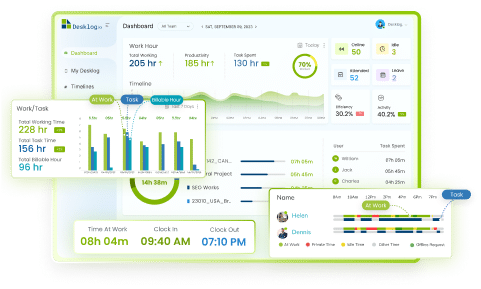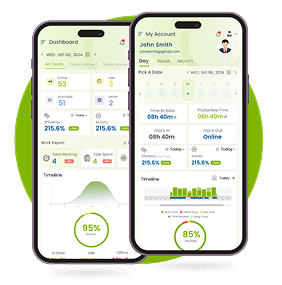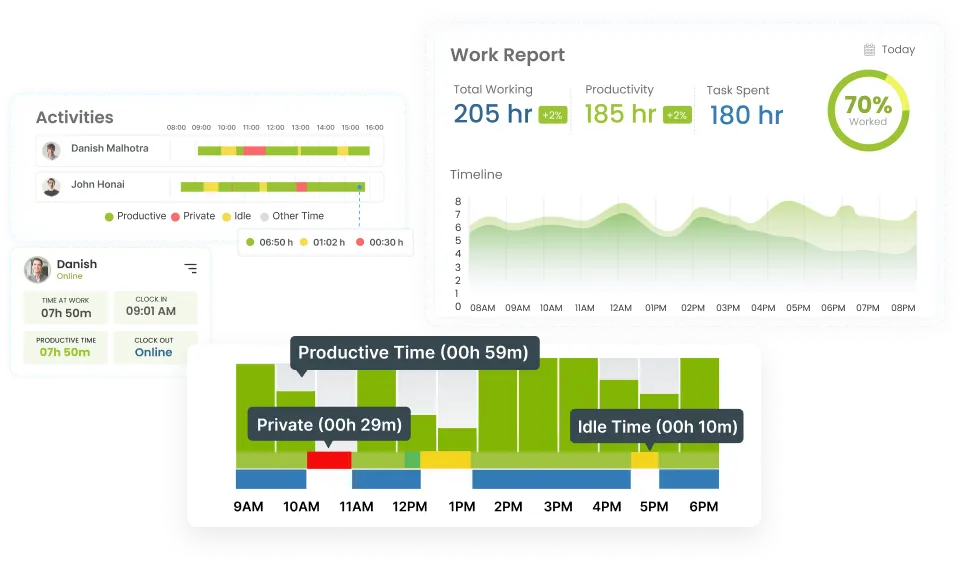Working from home has always been a favorite of many. No traffic jams, no crowded trains, just you and your work. Well, the work-from-home (WFH) revolution is booming, with studies showing that a whopping 35% of the global workforce is now working remotely at least some of the time. But is WFH all sunshine and rainbows?
Like the two sides of a coin, working from home has its own advantages and challenges. While it offers numerous benefits, it also presents several difficulties. In this blog, we’ll explore the pros and cons of working from home. So, buckle up, because we’re about to uncover the good, the bad, and the fuzzy slippers of the WFH life.
Pros and Cons of Working From Home
When weighing working from home pros and cons, several factors come into play. On one hand, the perks of skipping the daily commute and enjoying ultimate schedule flexibility, can greatly enhance work-life balance and productivity.
In contrast, challenges such as maintaining focus amidst household distractions and feelings of isolation gives significant hurdles in a remote environment.
A detailed discussion differentiating pros and cons of working from home is necessary, as remote work has become a norm in today’s world.
Pros of Working from Home |
Cons of Working from Home |
|---|---|
More Work Flexibility |
Costly Equipment |
Improved Focus |
Risk of Lower Productivity |
Better Attendance and Punctuality |
Plenty of Distractions |
Access to Wider Talent Pool |
Social Isolation |
Better Collaboration |
Lesser Communication & Collaboration |
More Independence |
Less Face Time |
Increased Productivity |
Risk of Overworking |
Pros of Working From Home
More Work Flexibility
Working from home allows employees to create different schedules that fit their personal lives and peak productivity times. This flexibility can include setting their own work hours, taking breaks when needed, and creating a work environment that suits their individual needs. It leads to higher employee satisfaction, a better work-life balance, and the ability to manage both professional and personal responsibilities more effectively.
Improved Focus
The home environment can be customized to minimize distractions, allowing employees to focus better on their tasks. Without the typical office interruptions, such as casual conversations or noise, employees can work more efficiently. Enhanced concentration leads to higher productivity and the quality of work improves as employees can dedicate more uninterrupted time to their tasks.
Better Attendance and Punctuality
Remote work eliminates commuting, which reduces lateness and absenteeism. Employees are more likely to start their work on time and are less likely to take unscheduled leave, since they can manage minor health issues or personal matters without needing to take a day off. Consistent attendance and punctuality contribute to smoother workflow, better team coordination, and higher overall productivity.
Access to Wider Talent Pool
Companies that offer remote work can hire employees from anywhere in the world, not just those within commuting distance. This means they can select from a broader range of candidates with diverse skills and experiences. Access to a wider talent pool can lead to a stronger and more diverse workforce, bringing in different perspectives and potentially higher innovation and creativity.
Better Collaboration
Contrary to the belief that remote work hampers collaboration, it can enhance it through the use of digital tools and platforms designed for remote teamwork. Virtual meetings, collaborative software, and cloud-based project management tools can facilitate seamless communication and teamwork. Improved collaboration tools ensure that team members can work together effectively regardless of their physical location, often leading to more dynamic and frequent interactions and better project outcomes.
Cons Of Work From Home
It is reported that 43 % of employees who work from home tackle constant interruptions, 23% battles for home office space, and the majority face slow internet connection, isolations, and endless work days. These stats show that there are a number of cons of working from home. Let’s discuss some of them in detail.
Costly Equipment
Setting up a home office often requires purchasing or upgrading equipment such as a reliable computer, high-speed internet, ergonomic furniture, and other office supplies. Employees might also need to invest in software licenses or additional technology to maintain a productive work environment. The initial and ongoing costs can be significant, especially for those on a tight budget. Employers may provide some support, but the financial burden often falls on the employee.
Risk of Lower Productivity
Not everyone thrives in a home environment. Some individuals may struggle with self-discipline and time management without the structure of an office setting. The lack of direct supervision can lead to procrastination or inefficiency. Lower productivity can affect job performance and overall business outcomes. It can also lead to a perception of remote workers being less committed or effective compared to their in-office counterparts.
Plenty of Distractions
The home environment can be filled with distractions such as household chores, family members, pets, and personal devices. These distractions can interrupt the workflow and reduce the time spent on work tasks. Frequent interruptions can lead to a decrease in the quality and quantity of work produced. It can also extend the time needed to complete tasks, resulting in longer working hours and potential burnout.
Social Isolation
Working from home can lead to feelings of loneliness and isolation due to the lack of in-person interactions with colleagues. The absence of casual office conversations and team-building activities can make remote workers feel disconnected from their teams and the company culture. Social isolation can negatively impact mental health and well-being, leading to decreased motivation and job satisfaction. It can also hinder collaboration and the development of professional relationships.
Limited Access to Information
Remote workers may face challenges in accessing important information or resources that are readily available in an office setting. Delays in communication or difficulties in obtaining necessary documents and support can impede their ability to perform tasks efficiently. Limited access to information can slow down decision-making processes and project progress. It can also lead to misunderstandings and errors if employees are not able to get the guidance or data they need in a timely manner.

Did You Know
In 2022, 64% of executives noted a negative impact on their employees’ mental health due to remote work, up from 52% the prior year, as per a survey by RSM US and the US Chamber of Commerce.
Tips for businesses that want to make remote work a long-term option
Establish a Digital Work Culture
Creating a digital work culture involves defining and promoting values, behaviors, and practices that support remote work. This includes fostering trust, accountability, and flexibility while encouraging virtual social interactions and team-building activities.
A strong digital work culture helps employees feel connected and engaged despite physical distances. It ensures that everyone understands and aligns with the company’s mission and values, promoting a cohesive and motivated workforce.
Focus on Employee Experience
Prioritizing the employee experience means addressing the needs and well being of remote workers. This can involve providing ergonomic home office setups, mental health resources, flexible work schedules, and opportunities for career development.
A positive employee experience leads to higher job satisfaction, retention, and productivity. By ensuring that remote employees feel valued and supported, businesses can foster loyalty and reduce turnover rates.
Enhance Communication and Collaboration
Effective communication and collaboration are crucial in a remote work environment. This involves using various tools and platforms to facilitate seamless interactions, such as video conferencing, instant messaging, and collaborative project tracking software.
Enhanced communication and collaboration tools ensure that team members can easily share information, brainstorm ideas, and work together on projects, regardless of their physical location. This leads to better teamwork, innovation, and project outcomes.
Provide Technology Support
Providing technology support means ensuring that remote employees have access to the necessary hardware, software, and IT assistance to perform their tasks efficiently. This includes offering training on new tools, troubleshooting technical issues, and maintaining cybersecurity.
Adequate technology support minimizes downtime and technical disruptions, allowing employees to focus on their work. It also helps protect company data and ensures that employees can use digital tools effectively, boosting overall productivity.
Ensure Productivity Using Digital Workplace Tools
Implementing digital workplace tools involves using software and platforms designed to enhance productivity and streamline workflows. This can include time-tracking apps, task management systems, and performance analytics tools.
Digital workplace tools provide employees and managers with insights into productivity levels and project progress. They help in setting clear goals, tracking achievements, and identifying areas for improvement, ensuring that remote work remains efficient and effective in the long term.
Transforming Your Business For The Future
As we discussed, it’s clear that while remote working offers numerous benefits maintaining a balance between work and life., it also presents unique challenges. Maintaining productivity, ensuring effective communication, and managing remote teams can be daunting. However, the digital age brings a myriad of solutions to overcome these obstacles, with time tracking software standing at the forefront of these innovations.
One such powerful tool is Desklog time tracking software. Desklog is designed to help companies manage their remote teams efficiently while enabling remote workers to stay aligned with company goals.
Tracking Remote Teams with Desklog
Managing a remote team requires visibility into employees’ activities and productivity. Desklog provides a multitude of time tracking features that allow managers to track how team members are spending their work hours. By tracking active and idle times, project timelines, and task completion rates, managers can gain valuable insights into team productivity and identify areas that need improvement. This transparency ensures that remote teams remain productive and projects stay on schedule.
Desklog also offers automated screenshot capturing and App & URL tracking, which provides an additional layer of accountability. It also provides break time and overtime notifications to prevent employees from working continuously for a period of time. These features help managers verify that work hours are being utilized effectively without intruding on employees’ privacy, maintaining a balance between work and life.
Empowering Remote Workers
For remote workers, Desklog serves as a personal productivity assistant. It helps employees manage their time more effectively by providing a clear breakdown of how their workday is spent. This self-awareness can lead to better time management and increased productivity. Employees can easily track their progress on tasks and projects, set goals, and ensure they are meeting deadlines.
Desklog also facilitates better communication within teams. By integrating with various project management tools like Jira, it ensures that all team members are on the same page, regardless of their physical location. This integration supports seamless collaboration and keeps everyone aligned with the company’s objectives.
Conclusion
So, is working from home the ultimate dream job or a recipe for distraction and isolation? The truth, as with most things in life, is that it depends. The WFH landscape offers a unique set of advantages and also hurdles. By weighing the pros and cons, and considering your own working style and personality, you can determine if a remote work environment is the key to your productivity and happiness. Ultimately, the decision of whether to work from home is yours. But with the knowledge you’ve gained here, you can approach this choice with confidence.
FAQ
1 Why working from home is healthy?
Mental health benefits of working from home is Better work-life balance – Without the stress and time it takes to drive to work, you may have more flexibility for things like self-care, hobbies and your relationships with family and friends.
2Which is better, work from home or office?
Working at home offers some people a more flexible schedule and less pressure. For others, getting into an office environment provides more structure and accountability. Ultimately, it’s up to you where you want your team members working, and it’s up to you to determine which approach best suits your mutual needs.
3What is the biggest problem with working from home?
Time tracking is one of the biggest challenges of working from home, as employees often lose sense of time. Poor time management quickly becomes a problem for both the employee and the employer. A regular routine will bring order to the workweek and give you enough time for all of your commitments.
4 How can one stay motivated while working from home?
To stay motivated while working from home,
Establish a routine
Create a dedicated workspace
Take breaks
Stay connected
Set goals
5 What are some strategies for maintaining work-life balance while working from home?
Follow the below steps to maintain a work life balance while working from home.
Set clear guidelines for when you’re “at work” and when you’re “off duty”.
Communicate with family members about your work schedule
Take regular breaks and make time for self-care activities.
Avoid working in places associated with relaxation, such as your bedroom or living room, to prevent burnout.
Log off at the end of the day to signal the transition from work to personal time.

















